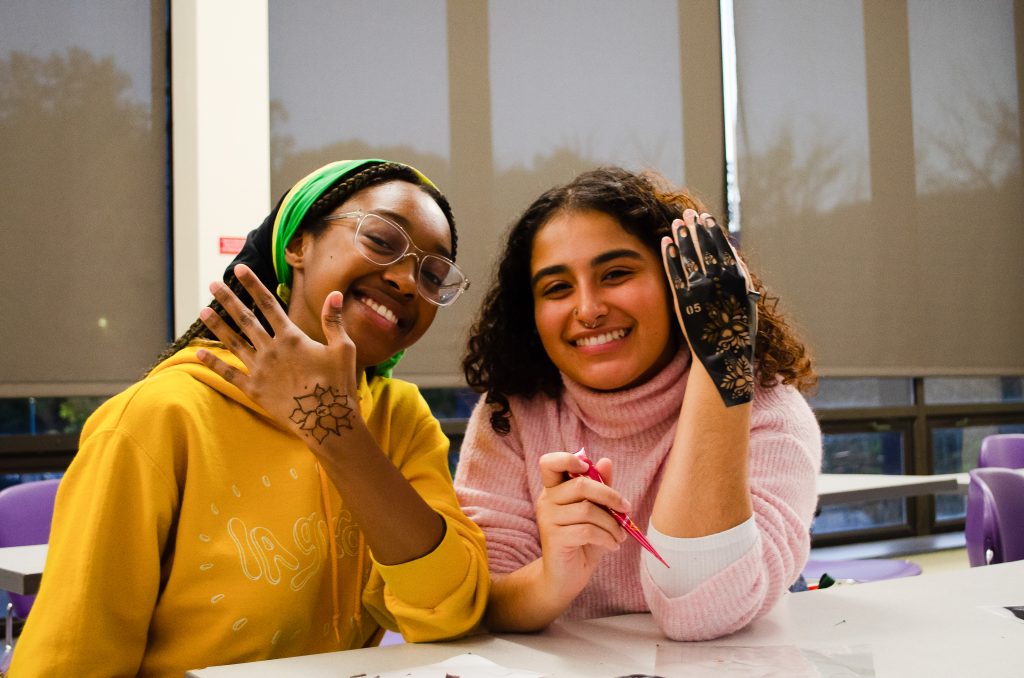Henna Club aims to foster community and creativity through an important cultural art form.
Founded in late February of 2023, Henna Club hosts events and workshops which teach participants how to make designs using henna paste, a natural dye made from the henna plant. The reddish-orange stain henna creates is due to lawsone, a molecule found in the leaves and stems of the plant that binds to proteins in the skin and hair. The club sources natural organic henna paste from a vendor to ensure that their events are safe and accessible for all students. Through these events, participants not only express themselves through their work, but also engage with an array of techniques used by communities around the world.
Sumaita Nazifa, co-president of Henna Club and a senior majoring in English, described how a gathering they held inspired the group’s creation.
“I had extra cones lying around and decided to have an impromptu henna night before the Pakistani Student Association’s Mock Shaadi event, as henna is commonly done on not just the bride before weddings, but the guests as well,” Nazifa wrote in an email. “It was some of our members’ first time getting their henna done, and we got to watch them fall in love with the process, and even pick up a cone to practice the art form themselves. It was the first time we all felt connected to each other in such a creative way.”
The practice of using henna to stain hands, feet or hair is common in many parts of the world.
Haridra Jariwala, the club’s cultural chair and a senior majoring in biology, acknowledged the use of henna in South Asia, Africa, The Middle East and diasporic communities around the globe. She explained how their organization works to incorporate various cultural traditions into their work.
“With such vast diversity of this art form, we as an organization try to incorporate it in our events [to be] as inclusive as possible,” Jariwala wrote in an email. “For instance, we collaborate with different organizations on campus like the Bengali Students Association (BSA), Indian International Student’s Union (IISU), Caribbean Students Association (CSA) and many more that expose our general body to different styles and cross-cultural understanding of traditions. We also host Henna Workshops that aim to teach our general body various styles and patterns from different origins.”
The club also hosts themed events, like Hennaween, where participants can get gothic inspired henna, and Match Made in Mehndi, an event with Valentine’s Day-themed designs. Their upcoming World Runway fashion show will take place on April 6 from 8 p.m. to 10 p.m. The event will include general body members and students from other organizations modeling henna designs from different cultures.
Ashley Varghese, the social chair of the club and a junior majoring in political science, described the impact the club hopes to have on the BU community.
“Through the unique art form of henna, we hope to make the Binghamton community a little more connected,” Varghese wrote in an email. “Since henna is prevalent in so many different cultures, we have been able to collaborate with a variety of student organizations. In fact, our upcoming Fashion Show will feature numerous student organizations, and we look forward to showcasing and appreciating different cultures and identities through unique henna designs. Henna is an art for everyone to enjoy, and we cannot wait to educate more people about the history and cultural significance of henna while providing them with a way to express themselves.”
Saanvi Shah, the club’s secretary and a junior majoring in biology, explained the importance of henna as a form of self-expression stemming from “centuries of artistic evolution and cultural significance” in South Asia, the Middle East and North Africa. She went on to emphasize the communal aspects of henna and its ability to bridge old and new traditions.
“Henna is deeply intertwined with rituals, celebrations and rites of passage, making it a vital part of cultural identity and heritage,” Shah wrote in an email. “The act of applying henna is often accompanied by communal gatherings and shared stories, fostering a sense of belonging and connection. Additionally, henna’s temporary nature allows for experimentation without permanent commitment, encouraging individuals to explore different designs and themes freely. Thus, henna emerges as a powerful form of self-expression, bridging tradition with modernity and providing a platform for individuals to showcase their identity, creativity and cultural pride.”



